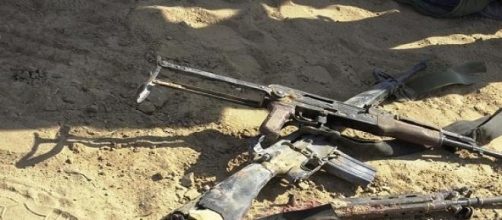The ISIS terror suspect nicknamed "Jihadi John" owing to his appearances in the brutal beheading videos, has been named by the Washington Post. He has been identified as 27 year-old Mohammed Emwazi, who was born in Kuwait but moved to the UK in 1994. He studied at the University of Westminster, from which he graduated with a computing degree, and attended an unnamed mosque in Greenwich.
Since his name has been published, social media accounts of family members have been deleted. Police attended his former residence, but his family refused to comment. Scotland Yard will neither confirm nor deny these reports but Emwazi had been monitored by security services as far back as 2010. The International Centre for the Study of Radicalisation confirmed the identification to be correct.
Jihadi John has appeared in the most infamous of the IS videos depicting the beheading of Westerners. These include the killings of US journalists James Foley and Stephen Sotloff, British Aid workers Alan Henning and David Haines, US aid worker Peter Kassig, and most recently Japanese hostage Kenji Goto. In each of the videos, he speaks in a British accent before putting a knife to the victims' heads and appearing to decapitate whilst the video is still rolling.
There is little online trace of his movements, apart from when he attempted to undertake a safari in Tanzania back in 2009 but was arrested by police and held overnight. He flew back via Amsterdam, where he was again detained by British Security Services, accusing him of attempting to travel to Somalia to join Al-Shabab.
He returned to Kuwait in 2009 to take up a job in computers. When he returned to the UK for a short stay in 2010, he was detained by British counter terrorism officers and was refused a visa to go back to Kuwait. It is thought that his dissatisfaction with the security services stemmed from these arrests which he felt supressed his liberty.
He told CAGE, an Islamic prisoner's rights group, "I feel like a prisoner, only not in a cage, in London. A person imprisoned and controlled by security services men." In subsequent correspondence when trying to find the reason for the refusal of his visa, he stated, "Kuwait has no problems with me entering, and the reason for my refusal is simply because the UK agents have told them not to let me in."
Despite being on the terror watch list, Emwazi tried to travel to Kuwait again in 2013 but was prevented. He disappeared and ended up in Syria where he later joined ISIS. Despite claiming to know the identity of Jihadi John back in September 2014, the FBI chose then not to reveal his identity, as they thought this would be the best strategy for bringing him to justice. The news reported by The Washington Post has shocked his former staff at the University of Westminster. The security services must believe that the time is now right for the information to be in the public domain.
© ALL RIGHTS RESERVED

